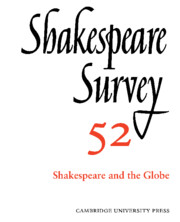Book contents
- Frontmatter
- Reconstructions of the Globe: A Retrospective
- ‘Useful in the Year 1999’: William Poel and Shakespeare’s ‘Build of Stage’
- Reconstructing the Globe: Constructing Ourselves
- From Liturgy to the Globe: the Changing Concept of Space
- The Arithmetic of Memory: Shakespeare’s Theatre and the National Past
- Maximal and Minimal Texts: Shakespeare v. the Globe
- William Shakespeare’s Romeo + Juliet: Everything’s Nice in America?
- Which is the Jew that Shakespeare Knew?: Shylock on the Elizabethan Stage
- A Little Touch of Harry in the Light: Henry V at the New Globe
- Gulls, Cony-Catchers and Cozeners: Twelfth Night and the Elizabethan Underworld
- The Globe, the Court and Measure for Measure
- Macbeth and the Antic Round
- Macbeth / Umabatha: Global Shakespeare in a Post-Colonial Market
- When All is True: Law, History and Problems of Knowledge in Henry VIII
- ‘All which it inherit’: Shakespeare, Globes and Global Media
- ‘Delicious traffick’: Alterity and Exchange on Early Modern Stages
- The 1998 Globe Season
- Shakespeare Performances in England, 1998
- Professional Shakespeare Productions in the British Isles January-December 1997
- The Year's Contributions to Shakespeare Studies 1 Critical Studies
- 2 Shakespeare’s Life, Times, and Stage
- 3 Editions and Textual Studies
- Books Received
- Index
The Globe, the Court and Measure for Measure
Published online by Cambridge University Press: 28 March 2007
- Frontmatter
- Reconstructions of the Globe: A Retrospective
- ‘Useful in the Year 1999’: William Poel and Shakespeare’s ‘Build of Stage’
- Reconstructing the Globe: Constructing Ourselves
- From Liturgy to the Globe: the Changing Concept of Space
- The Arithmetic of Memory: Shakespeare’s Theatre and the National Past
- Maximal and Minimal Texts: Shakespeare v. the Globe
- William Shakespeare’s Romeo + Juliet: Everything’s Nice in America?
- Which is the Jew that Shakespeare Knew?: Shylock on the Elizabethan Stage
- A Little Touch of Harry in the Light: Henry V at the New Globe
- Gulls, Cony-Catchers and Cozeners: Twelfth Night and the Elizabethan Underworld
- The Globe, the Court and Measure for Measure
- Macbeth and the Antic Round
- Macbeth / Umabatha: Global Shakespeare in a Post-Colonial Market
- When All is True: Law, History and Problems of Knowledge in Henry VIII
- ‘All which it inherit’: Shakespeare, Globes and Global Media
- ‘Delicious traffick’: Alterity and Exchange on Early Modern Stages
- The 1998 Globe Season
- Shakespeare Performances in England, 1998
- Professional Shakespeare Productions in the British Isles January-December 1997
- The Year's Contributions to Shakespeare Studies 1 Critical Studies
- 2 Shakespeare’s Life, Times, and Stage
- 3 Editions and Textual Studies
- Books Received
- Index
Summary
Measure for Measure was written within the first twenty-one months of King James’s reign, and probably first was seen on the stage when the Globe re-opened in the later summer of 1604, prior to the play’s recorded performance before the king at Whitehall Palace on St Stephen’s Day, 26 December. The long closure of the Globe, first for the death of Queen Elizabeth and then for the serious plague which immediately followed in 1603 and 1604, suggests on the one hand that Shakespeare would have had more leisure to write; on the other, that there would have been no compelling need for him to provide new plays when his company was largely inactive and had the prospect of remaining so. Court patronage provided welcome oases within this stretch of theatrical desert, and it has understandably fed suppositions that the grandly named King’s Men had a rather closer relationship with their monarch than did any players in the old queen’s reign. The payment of thirty pounds to Burbage on behalf of his fellows in February 1604 ‘for the mayntenance and releife of himselfe and the rest of his company being prohibited to prsente any playes publiquelie in or neere London’, ‘by way of his Maties free gifte’, particularly in the absence of similar payments to the other companies, may be taken as a sign of special favour. And if the company as a whole was favoured, their leading dramatist, ‘the King’s Playwright’ as he has been dubbed by Alvin Kernan, is quite likely to have responded with entertainment which reflected the new ruler’s theoretical interests in the properties of government and the procedures of the law.
- Type
- Chapter
- Information
- Shakespeare Survey , pp. 133 - 142Publisher: Cambridge University PressPrint publication year: 1999
- 1
- Cited by



